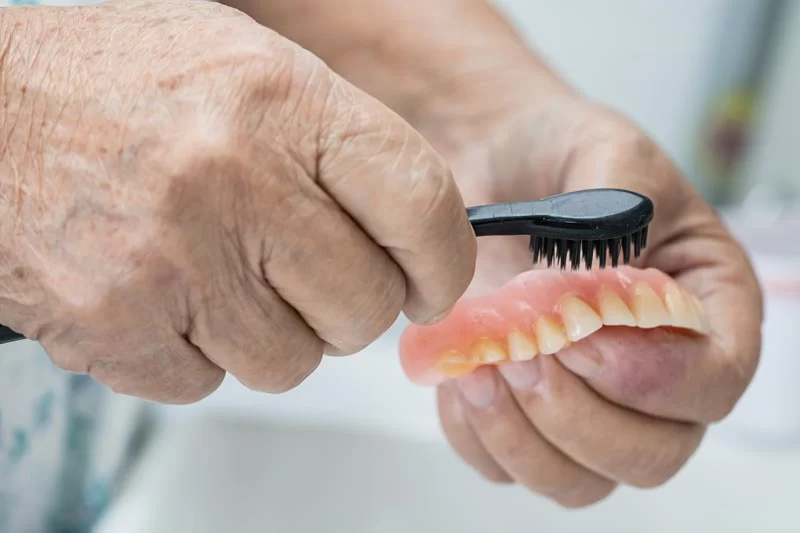
Dental Care Tips for Elderly with Dentures: Essential Tips for Healthy Smiles
- Understanding Dentures
- Proper Care for Dentures
- Oral Hygiene Tips for Elderly
- When to Visit the Dentist
- Real-Life Stories of Denture Success
Understanding Dentures
Dentures are removable dental appliances designed to replace missing teeth. For elderly individuals, dentures play a crucial role in restoring both function and appearance, helping to regain confidence while eating, speaking, and smiling. However, proper care for dentures is vital to ensure they last and maintain comfort.
There are two main types of dentures: complete dentures (which replace all teeth) and partial dentures (which replace a few missing teeth). Both types require regular maintenance to avoid damage and maintain their fit, which can change over time due to changes in the shape of the gums or jaw.
Proper Care for Dentures
Taking care of dentures isn’t just about cleaning them – it also involves proper storage and handling. Here are some key steps to ensure your dentures stay in top condition:
- Clean Regularly: Dentures should be cleaned daily to remove food particles and plaque. Use a soft-bristled toothbrush designed for dentures or a denture-specific cleaner. Avoid using regular toothpaste, as it can be abrasive and cause scratches on the surface.
- Soak Them Overnight: Always remove your dentures at night to give your gums a chance to rest. Soak them in a denture-cleaning solution or warm water to prevent warping and help keep them moist.
- Handle with Care: Dentures can be fragile, so when handling them, be sure to do so gently. Consider placing a towel in the sink when cleaning dentures to prevent them from breaking if dropped.
- Check for Damage: Regularly inspect your dentures for any signs of wear and tear, such as cracks or loose teeth. If you notice any issues, visit your dentist for repairs.
Oral Hygiene Tips for Elderly
While dentures provide excellent functionality for seniors, oral hygiene still plays an essential role in maintaining overall oral health. Here are some tips to keep the mouth healthy even when wearing dentures:
- Brush Your Gums and Tongue: Even if you wear dentures, it's important to brush your gums and tongue every morning before putting your dentures in. This helps stimulate blood flow to the gums and removes any bacteria that can cause irritation or infection.
- Use a Soft Toothbrush for Natural Teeth: If you have any remaining natural teeth, brushing them with a soft-bristled toothbrush and fluoride toothpaste is essential to prevent cavities and gum disease.
- Maintain Good Saliva Flow: A dry mouth is a common issue for older adults, but it can cause discomfort when wearing dentures. Drinking plenty of water, chewing sugar-free gum, or using saliva substitutes can help keep the mouth moist and comfortable.
- Regular Denture Checkups: Even if your dentures feel fine, it’s important to schedule regular checkups with your dentist to ensure they continue to fit correctly and don’t cause any damage to your gums or oral tissues.
When to Visit the Dentist
Regular dental visits are crucial for elderly individuals wearing dentures. While dentures themselves don’t need professional cleaning as often as natural teeth, routine checkups can help detect potential issues such as:
- Poor Fit: Over time, the gums and jawbone can change, which can cause dentures to become loose or uncomfortable. Your dentist can adjust them to restore the perfect fit.
- Signs of Infection or Irritation: If your gums feel sore or inflamed, it could be a sign of infection. Your dentist will examine your mouth to ensure there are no issues that could lead to complications.
- Teeth or Denture Damage: If your dentures are cracked, chipped, or if any teeth become loose, visit your dentist immediately for repairs. Prolonged damage can affect their function and comfort.
Real-Life Stories of Denture Success
Many seniors who wear dentures find that their lives are transformed once they get the hang of proper care. For instance, Margaret, a retired school teacher, shared how proper denture care made a huge difference in her quality of life: “At first, I struggled with my dentures, but once I established a cleaning routine and started soaking them overnight, everything changed. Now, I feel more confident when I talk or eat in public!”
Similarly, John, a 72-year-old gardener, recalls how switching to a better-fitting set of dentures improved his comfort: “My first set was ill-fitting and caused pain, but after a quick adjustment by my dentist, I was able to enjoy my meals again without any discomfort.”
If you're looking to ensure that your dentures are comfortable, functional, and long-lasting, make sure to follow the tips for elderly dental care outlined here. And, if you're in need of expert advice or assistance with your dentures, don't hesitate to visit Dentistry Toothtruth for further information and products.







 Nordberg Family Dentistry4.0 (22 review)
Nordberg Family Dentistry4.0 (22 review) Lane & Associates Family Dentistry - Raleigh Wake Forest Road4.0 (1405 review)
Lane & Associates Family Dentistry - Raleigh Wake Forest Road4.0 (1405 review) Michael E Krone & Associates5.0 (39 review)
Michael E Krone & Associates5.0 (39 review) Doc Bresler's Cavity Busters4.0 (363 review)
Doc Bresler's Cavity Busters4.0 (363 review) Silicon Valley Dental4.0 (214 review)
Silicon Valley Dental4.0 (214 review) Oakwood Dental Arts4.0 (470 review)
Oakwood Dental Arts4.0 (470 review) The Importance of Oral Health Education During Pregnancy for a Healthy Pregnancy
The Importance of Oral Health Education During Pregnancy for a Healthy Pregnancy Best Tips for Brushing Your Teeth Properly for Healthy Gums: Essential Techniques for Oral Health
Best Tips for Brushing Your Teeth Properly for Healthy Gums: Essential Techniques for Oral Health Why Skipping Dental Checkups Can Lead to Bigger Oral Health Problems
Why Skipping Dental Checkups Can Lead to Bigger Oral Health Problems Advantages of Porcelain Dental Restorations
Advantages of Porcelain Dental Restorations How Can Diabetes Cause Tooth and Gum Problems? Preventing and Managing Oral Health Issues
How Can Diabetes Cause Tooth and Gum Problems? Preventing and Managing Oral Health Issues Healthy Habits for Promoting Good Oral Health and Hygiene: Tips for a Healthy Smile
Healthy Habits for Promoting Good Oral Health and Hygiene: Tips for a Healthy Smile